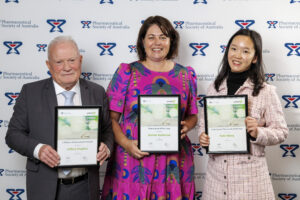Next gen Early Career Pharmacist leaders introduced
25 August 2025
The Pharmaceutical Society of Australia (PSA) has today introduced the new crop of leaders for the Early Career Pharmacist (ECP) Community of Specialty Interest (CSI), a dynamic group dedicated to empowering the next generation of pharmacists across Australia.
Dr Ayomide Ogundipe MPS has been re-appointed for a third term as Chair of the Early Career Pharmacist Leadership Group and ECP Director on the PSA National Board.
For the first time the Early Career Pharmacist CSI will also include a representative practising in the Northern Territory.
In announcing the new leadership team, Dr Ogundipe reaffirmed her commitment to a thriving ECP community.
“I’m honoured to be reappointed to the PSA Board for my third and final term as the Early Career Pharmacist Director. It’s been a privilege to represent and advocate for my peers during such a transformative time in pharmacy,” Dr Ogundipe said.
“This role has been one of the most meaningful experiences of my career, and I’m grateful for the opportunity to continue contributing to the strategic direction of our profession.
“As I step into this final term, I remain deeply committed to ensuring that early career pharmacists have a strong voice in decision-making and policy development.
“It’s a privilege to welcome the new members of the ECP CSI Leadership Group, each bringing unique experience, drive and perspective that will be instrumental in shaping the future of our profession.
“This leadership group represents the best of what’s next – thoughtful, engaged pharmacists who are ready to make a real impact in their communities and across the profession. It’s incredibly exciting to support a new cohort of leaders who are ready to represent and advocate for early career pharmacists at all levels.
“Our early career pharmacists are the future of pharmacy, and I’m inspired by the energy, diversity and ideas that this new group brings. I look forward to seeing how they lead, challenge and elevate the profession.
“We’re proud that the CSI leadership group now has representation from across the country, including the Northern Territory for the very first time since its inception. This reflects our commitment to ensuring all regions and voices are included in shaping the future of the profession.
“I want to thank Jala Moushi, Keiran Batavia, Shaylee Mills, Monique Licht and Erin Cooper for their support and dedication in building our CSI into the thriving, connected community it is today,” Dr Ogundipe concluded.
The 2025-26 Early Career Pharmacists CSI is lead by:
Dr Ayomide Ogundipe MPS (Chair)
James Buckley MPS, Queensland
Joshua Cooper MPS, Victoria
Elissar Mansour MPS, New South Wales
Zineb Medrek MPS, ACT
Rhiannon Price MPS, Western Australia
Abby Richardson MPS, Queensland
Lucy Rowell MPS, Tasmania
Leon Tcha MPS, Northern Territory
Raymond Truong MPS, South Australia
PSA looks forward to working closely with the new ECP CSI leaders as they continue to champion the voice of early career pharmacists and contribute meaningfully to the advancement of pharmacy practice in Australia.
Media contact: Georgia Clarke M: 0480 099 798 E: georgia.clarke@psa.org.au


